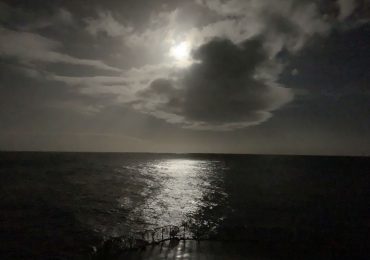The JRB presents a new short story by Franki Jenkins.
Take Me Away
Hannelie had been working at the Super Video in Konradsrus for one year and three months exactly when Nicholas was dropped off at his uncle’s house four houses down from her. At a glance, he looked much like most white people in the town. He was tall with a pink undertone to his skin, and he wore shorts until just above the knee, and his T-shirt was made in Bangladesh. When he passed by the shop later on, however, two things were striking to Hannelie: first, she had never seen him before. Second, when he loudly asked his cousin whether DVD shops really still existed here, his accent was like a gentler version of those funny Australian-man reviews she sometimes watched on Facebook. She thought she would vomit with excitement when she heard him ask brightly, right after passing the shop, ‘Who’s the girl?’
Hannelie’s looks were, she often thought to herself, wasted on this town. Her Instagram following, while not as vast as she would like, was almost twice the size of her town’s population. Unfortunately, owing to the nature of her photos and the nature of her (white, Afrikaner) circle in town, nobody from there knew about @honeysmooth97 or the grammatically incorrect photoshoot invitations she sometimes received in her DMs from users who offered her money or dick pics.
The new boy, Nicholas, was from Brisbane, Australia. He was on a gap year, had cousins who lived in rural South Africa, and had decided to come for a month or so. He was only dimly aware of the history of the place he had just arrived in. He knew about Nelson Mandela and the end of apartheid. He had met some (white) South African immigrants in Australia who had told him terrifying crime stories, and he knew that his local cousins had hilarious accents and treated him with a respect he wasn’t used to, but enjoyed nonetheless. He didn’t know that in the town he was visiting only a handful of people were white, that ever since the farmers of old had paid labourers in liquor an alcohol problem had ravaged the valley, or that the men of the town, white and black alike, still hit women as though their soft flesh embodied the teeming disappointments of life.
The girl he had just seen in the hilarious DVD rental shop? That pale beauty who was too modest to even make eye contact with him? How was he to know that her grandfather had been famous in the town for disciplining his workers—disciplining them until they did not exist anymore? Nick was an aspiring anthropologist, vegetarian, and lover of marijuana. He liked electronic music and socialist memes, and hated making anyone, including himself, uncomfortable. Realistically, he knew he would probably end up doing market research for real estate developers on the Gold Coast.
Gladys saw the new, foreign white boy walk past the corner store later that same day. He nodded and smiled at her enthusiastically and she thought, ‘Haai, shame’. It had been months since a new face had appeared in the town, and she was pleasantly surprised that this face was young, friendly and unaware of Konradsrus’s rules. She nodded at him stoically and prepared herself for the onslaught of gossip that was shortly to enter her life. Gladys had been working for Hannelie’s family since she was sixteen. She was excellent at matter-of-fact summations of events. She had two preteen children, and Hannelie, whom she spoiled, and secretly followed on Instagram.
By the afternoon, Hannelie had already managed to source all the available information about Nicholas. His cousins, the Viljoens, owned the local bar. The local white bar. He was here to help them with it since he was, astonishingly, related to them. When her shift was over she said a hurried goodbye to Anel, the middle-aged widow who hated movies but was too lazy to work anywhere else, and started on her way home—on a route that happened to pass the bar.
Nicholas saw her passing by, and asked his cousin, Jaco, who she was. Jaco, who was twenty-six and had masturbated to her three years ago, but had moved on when his internet connection sped up, explained that she was the daughter of the Van Rooyens, who were the wealthiest fruit farmers in the region, and also the strictest parents, and wouldn’t let her leave home to study. She had started a long-distance degree, but had not enjoyed her subject (Accounting) so was working at the DVD shop to learn responsibility while she pondered her future.
Nicholas was intrigued—by the story, but also by the way she hadn’t opened her mouth since his first sighting of her, which left enough room for him to imagine her mental and physical perfection down to the last detail. The more his fantasy developed, the more he needed to see her again. Jaco informed him that the only way this could happen was if he went to Bible study with them later that night. Nicholas hastily agreed, saying it was just the kind of cultural experience he had come to take part in.
Bible study was, naturally, conducted in Afrikaans. However, all the aunties and uncles brought out their rusty English to communicate with this handsome foreigner and try to make him feel at home. They plied him with sweet treats and told him to come for dinner whenever he wished. They all had different versions of what tourist attractions he should be seeing first, and he enthusiastically agreed to visit every single place they proposed. Hannelie arrived late. She had spent a long time deciding what to wear, before putting on her oldest hoodie and jeans, resigned that she could never match up to the coolness of this Australian angel (she had done her fair share of fantasising).
It was only after the Bible reading, discussion and prayer were concluded that Nicholas got to say hello to his mystery girl. He didn’t love her accent. Her English wasn’t great either. But her eyes were massive, and so filled with trust that he knew a fling was on the cards. For her, the world was changing with every second as she perceived his growing interest. She tried to mock him, and although he seemed to find it strange he laughed along anyway. Somehow he managed to add her on Facebook. Now the ball was in her court. Her texting was top class. She had been texting people all over the world since she had access to the internet. That night, they both said goodnight to their family and relatives, and each lay in their own beds with no plans of sleeping. She asked him everything, about his school and friends, what he thought about the town, what Australia was like, did he read and if so what, and he replied to her and found her more and more fascinating with each question. She secured a meeting with him: her recommendation was the deserted pink house nestled away among one of the apple orchards her family owned. As a child, she had played there with her brothers. More recently, she had done some decent shoots there.
Nicholas, a little shocked by the speed at which she had arranged a meeting, told Jaco three days later, on a Saturday morning, that he wanted to go for a walk alone. The orchards were beautiful—rows of oranges and apples, occasionally trailing up against a slope. The morning air smelled of flowers and had a pleasant bite to it. At some point a tractor passed him with a trailer, on which sat six (black) farm workers. He gave them a big wave.
When he saw the pink walls of the house, and realised what could pass once he went in, he felt a brief wave of doubt—was it right to get romantic with a small-town girl who might be very inexperienced? He didn’t want to lead her on. But the doubt, and the newness of it all, only caused him to be more enticed, and as his heart rate sped up he stepped into a big room, filled with light from a gap where a massive glass windowpane had once been. Shards of glass were still scattered on the floor. She heard him from another room, in which she reclined in a hammock slung between two big hooks she had hammered in herself.
Gladys had brought her tea in bed that morning and asked why she was so happy. She had wanted to tell Gladys, but at the last minute she decided it wasn’t worth the risk of gossip. Sex and love were not topics a girl like Hannelie could possibly bring up, or be connected to. Her future in the town would be over. Hannelie had several distinct personal brands, and she was excellent at managing them.
Hannelie’s father came from a lineage of stoic men who were very good at running farms. Since 1994, these operations had not changed by much, but enough for the local (white) farmers to imagine that their (black) workers had become ‘entitled, lazy, and ineffective’. When Hannelie received her daily morning coffee from Gladys, she didn’t ever connect it to her great-grandfather and Gladys’s grandfather, and how one had punished the other for laziness, or drunkenness, or something, by locking him into the chicken coop right beside the ruined pink house—for too long, until he could never be punished again. She had been told the story once, by an out-of-town aunt, the hippie one who had gone to Cape Town and studied in English and was always criticising everything.
Gladys was part of the family. As Hannelie saw it, anyone with half a brain could look at Gladys’s role in their family and see that her grandfather could not possibly have been killed by any Van Rooyen. She chose to work there.
Hannelie got off the hammock when she heard Nicholas come in. It occurred to her that she had no idea what to say to him. Similarly, Nicholas wished he’d smoked a joint or maybe brought some drinks along. Hannelie was a pragmatic person, though, and in spite of her naiveté she knew this was her chance to get some romantic experience, from somebody who undoubtedly had the hard skills, and, as an added bonus, wasn’t going to tell the entire town about it. She therefore walked right over to him and embraced him, squeezing just that bit harder than she normally would. She was surprised to find her legs shaking. Her boldness evaporated after the hug, however, and Nicholas, somewhat relieved, immediately took up a paternal stance, following up on the texting conversation that had continued until four that morning.
‘I want to show you my photos of Fiji,’ he said, and asked if she wanted to chill somewhere, like on the hammock. He showed her his special ‘not-for-Instagram-not-for-sharing’ folder of holiday photos from his film camera. He and his tanned (white) friends with hands out of train windows and naked asses entering turquoise seas. His worldiness, his wealth of experience so affected Hannelie that she sat even closer to him on the hammock, leaning closer and closer until he acknowledged it with a hand on her leg.
Hannelie was momentarily amazed at how efficiently she had navigated her first foray into the sexual realm. And she would have persisted, had there not been a loud crash in the kitchen, which sent her fragile afternoon plans, and in fact the outlook of her next several years, into complete disarray. If anyone saw her here, like this, on the hammock, with the Australian, her reputation at church and among her (white) circle would take a huge knock. Considering her father’s wealth, her beauty and her public chasteness, it would circulate throughout the district for ever.
Nicholas was already in the ruin’s living area by the time Hannelie’s carefully managed image had finished flashing, in tatters, before her eyes. He let out a scream so loud that Hannelie thought the assailant might be her father himself, perhaps with his rifle. When she stepped towards him Nicholas pushed her back with a firm command to look away. Before doing so, she caught a glimpse of a farm worker (black) on the floor, with blood expanding in a small circle around his head.
She didn’t recognise his uniform, so she went back to look.
The farm worker was still alive, but his skin was a grey tone that she had never seen on a live person before. On the chest area of his uniform she could see a logo she didn’t recognise, apart from the name, which said ‘Van Rooyen Farms’.
Nick was vomiting. Hannelie went back to the garden, got her things, and instructed Nick in an emotionless tone to go home and pretend nothing had happened. She would call the police.
The first thing she saw when she got home was Gladys cooking, and the first thing she did was tell her everything that had happened. She erased Nick from the narrative, but kept all the other details. By the end, through chokes, strange snorting sounds and tears, she told Gladys that actually the man had looked a little bit like her. ‘Jirre, kind, don’t scare me like that, man.’ Gladys said she would call the police, and took Hannelie to lie down on the sofa.
At this stage, suspecting what she did, Gladys did not expect the police to find anything, and indeed they did not. Nick’s cousins soon heard about the incident, and regaled him (‘sick with a stomach bug’) with a famous ghost story from the area, which featured a murdered Afrikaans girl who wandered around the orchards and scared fruit pickers from time to time. Her boyfriend had killed her near the pink house—or perhaps it was a different one, that wasn’t the point. Hannelie was always out there, they said, dreaming in the orchards, basically looking for some new mental preoccupation. Everyone knew how bored she got working at that DVD store. Her story was, without a doubt, the result of excessive imagination.
Gladys knew exactly who the farm worker was. His outdated uniform and the wound on his head were sufficient evidence for her to reach a conclusion before she called the police. The description of the man, in addition to Hannelie’s rather shady account of events, lead the police to ask searching questions about her mental well-being rather than pursue a serious investigation. Her mother was given a gentle call to action, which resulted in a frustrating and one-sided heart-to-heart about how God was able to help with whatever was burdening Hannelie’s soul.
Hannelie waited until her mother had left and she could close her bedroom door before messaging Nick. They needed to see each other, that night if possible. The moment the occupants of her home were sure to be asleep, she dropped him a location pin near one of her father’s storage sheds, put on a large coat, and packed a blanket into a backpack. Nick was there waiting for her, underdressed for the cold but perhaps too stressed to realise. This time, their hug was furtive and intense. ‘What the fuck, Hannelie, what the fuck happened today?’ Their uncertainties, their doubts, made their embrace frenetic, and after desperate grabbing, squeezing, and kiss-biting the blanket was somehow positioned to accommodate their pale, shaking bodies.
In the dark, two kilometres away, Gladys sat beside the broken glass in the room in the orchard and waited. She had waited for two hours, and she would wait for as many as it took. On her cellphone screen was the Instagram profile of @honeysmooth97. She opened a photo of Hannelie, in the same pink house, sitting on the hammock, her back turned to the camera, her face looking over her shoulder with her lips slightly parted. The caption read, ‘Waiting for Someone to Save Me From this Town’. Gladys exhaled through her nose and shook her head, then sharply turned to the left, wondering if she had just heard footsteps on the grass outside.
- Franki Jenkins is a writer, student and teacher currently based in Cape Town. This is her second published short story.





